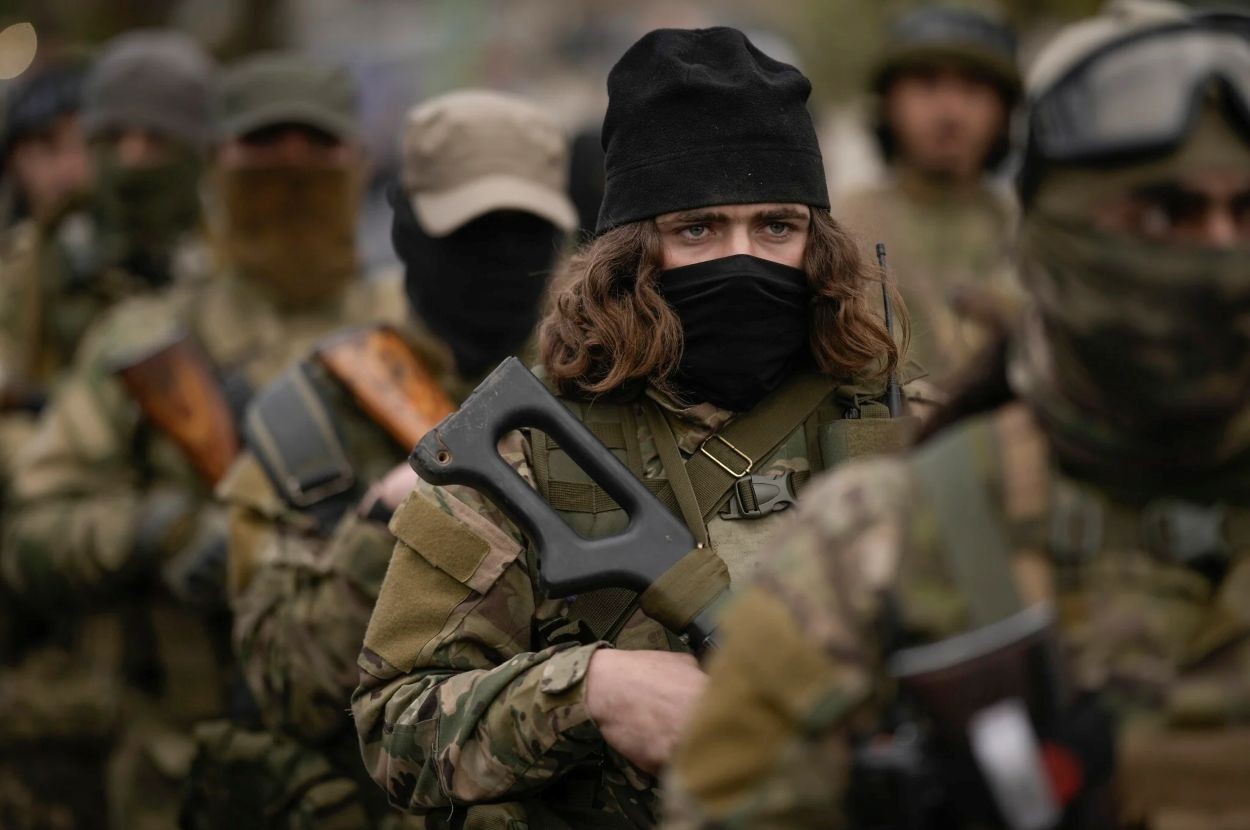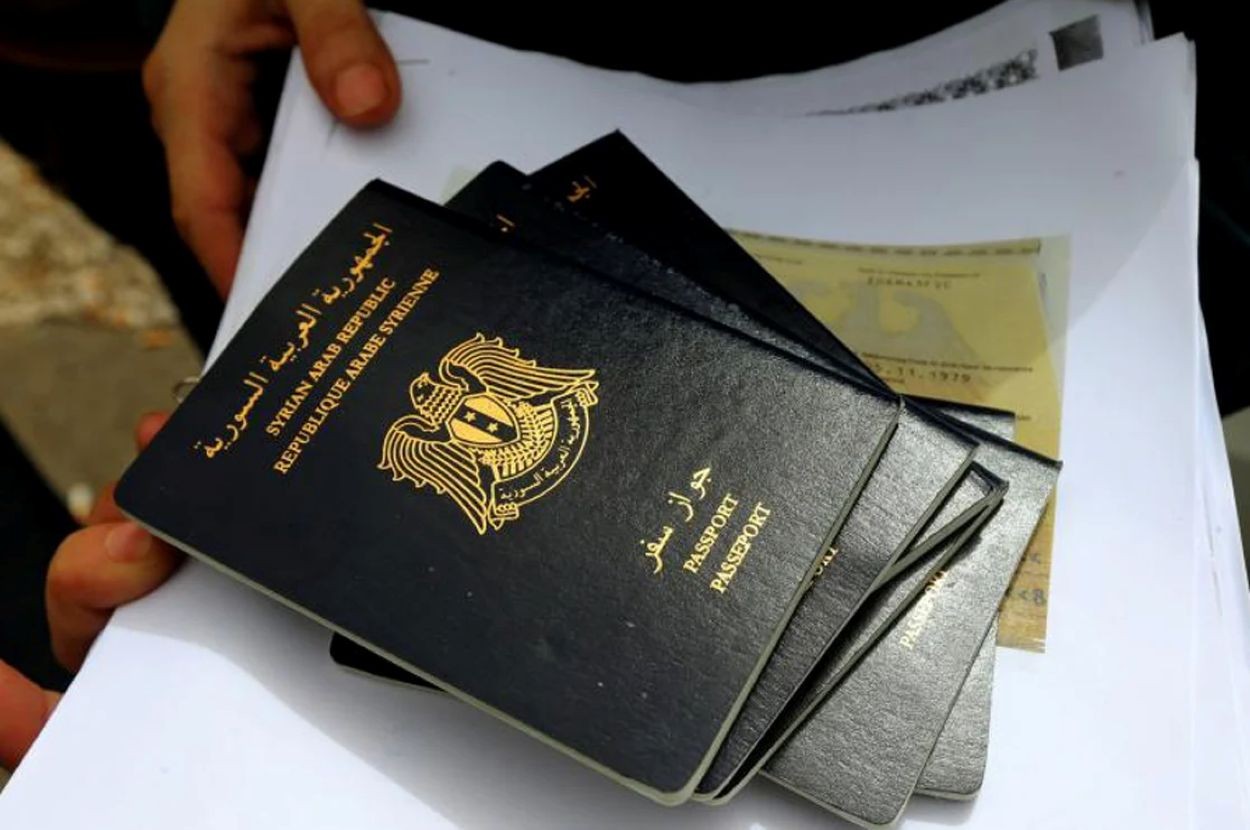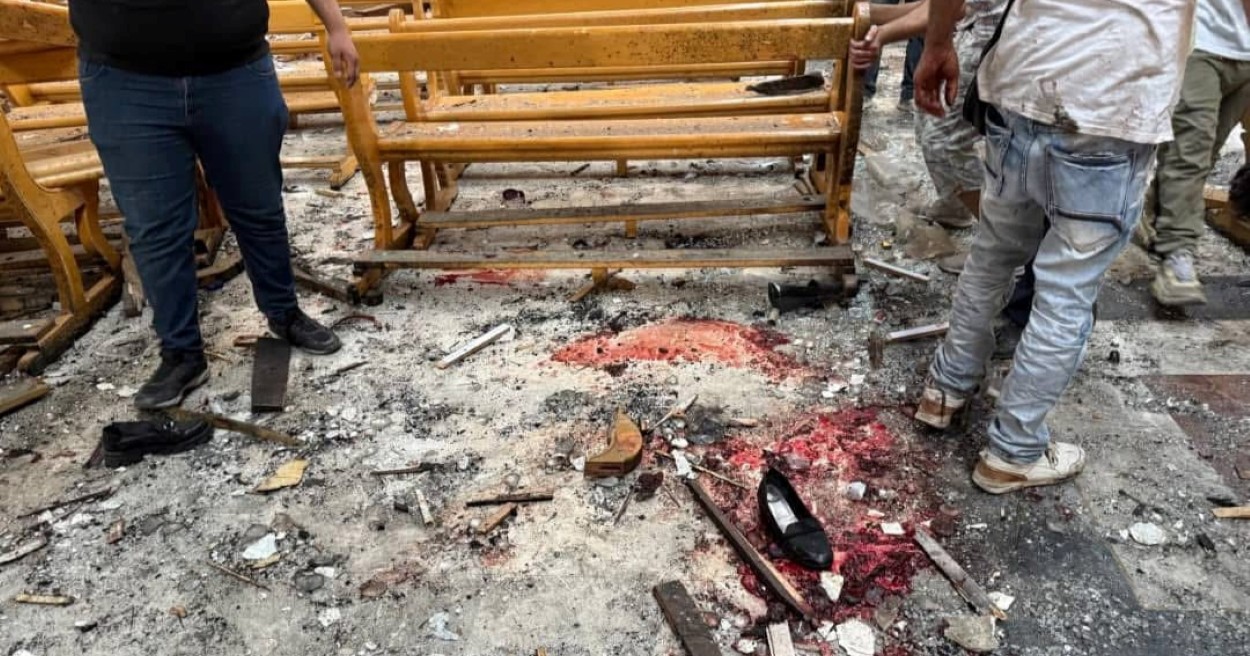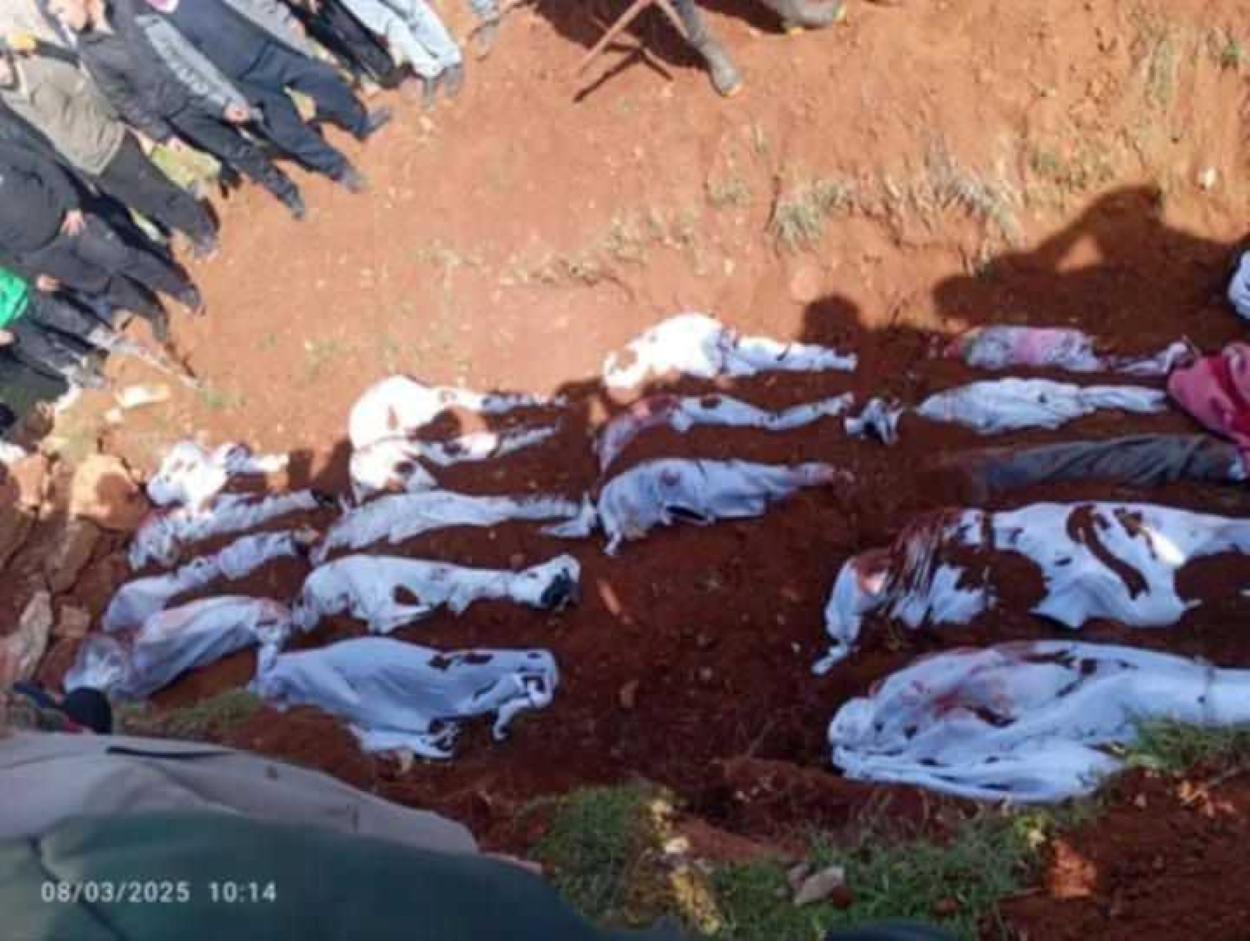Foreign Fighters and Citizenship: Syria’s Post-Assad Dilemma
DARAMSUQ (SyriacPress) — Under President Ahmed al-Sharaa, Syria has embarked on a tumultuous transition following the fall of the authoritarian regime of Bashar al-Assad. A central challenge is the fate of thousands of foreign jihadists who helped topple Assad and are now scattered across the country. Al-Sharaa, who headed Islamist organization Hayat Tahrir al-Sham (HTS) before taking on the role of transitional president, has publicly hinted that many of these fighters, and even their families, might be granted Syrian citizenship in recognition of “their role in fighting Assad.” Researchers estimate roughly 5,000 foreign militants remain in Syria, many married to Syrians and settling in communities in the former rebel northwest and parts of Daramsuq (Damascus) and Hmoth (Homs).
This investigation by SyriacPress reveals the growing normalization of these fighters under the Syrian government — and the grave threat this poses to Syria’s sectarian communities.
Early this year, US envoys signaled a dramatic policy shift. American officials quietly agreed to a plan to absorb about 3,500 foreign fighters, mainly Uyghurs from the Turkistan Islamic Party (TIP), into a new Syrian army unit. In return, the Syrian government has reportedly offered these fighters — along with their wives and children — Syrian passports “in recognition of their role in the liberation.” This offer, however, has roiled both supporters and critics, raising urgent questions about security, legality and Syria’s future.
Thousands of Foreign Fighters Remain
Before the regime change, tens of thousands of Sunnis from across the Muslim world had flocked to Syria’s civil war. Many joined the Islamic State (ISIS) or Al-Qaeda affiliates. HTS itself traces back to Jabhat al-Nusra, Al-Qaeda’s affiliate in Syria.
Al-Sharaa joined Al-Qaeda in Iraq before the 2003 invasion and fought in the Iraqi insurgency until his capture by US forces in 2006. After his release in 2011 at the beginning of the Syrian Revolution, he crossed from Iraq into Syria and founded the Al-Nusra Front in 2012 with funding from Al-Qaeda and assistance from the Islamic State in Iraq (ISI), the precursor to ISIS, to fight against the Assad regime. Once Al-Nusra was firmly established, he came under pressure from ISIS to officially merge with the group. Al-Sharaa opposed the merger, resulting in conflict between the groups. In 2016, he broke ties with Al-Qaeda and, in 2017, merged Al-Nusra with other Islamist factions to form Hayat Tahrir al-Sham, leading the group until its dissolution in early 2025. Despite moving away from international jihadism, al-Sharaa has brought the foreigners who fought with him to Daramsuq.
A significant pool of foreign fighters has been folded into state control. One Syria expert notes that perhaps 30% of the reconstituted army’s recruits could be these former fighters. As of early 2025, analysts estimate that roughly 5,000 foreign fighters still live in Syria. Many have put down roots. “We’ve had people from Belarus, Chechnya, Uzbekistan, and other places,” said Mohammed Kurdi, a barber who encountered foreign men in his shop. SyriacPress reporters have encountered foreign recruits zipping through streets on motorcycles, chatting in mosque squares, and manning checkpoints.
In Daramsuq two months ago, the Syrian Ministry of Defense announced a 49-officer cadre for the new army — six of those positions, ranks up to brigadier-general, went to foreigners. Meanwhile, three key HTS allied groups, including TIP, were officially disbanded and meshed into the new Syrian military and intelligence apparatus. Foreign fighters are highly visible in the capital and not shy about walking through civilian streets armed with automatic rifles.
In public remarks, al-Sharaa promised that non-Syrian veterans who fought Assad “were not here as an occupying force” and could earn citizenship, telling visiting French officials in May that he sees foreign fighters as individuals who “came to help” the Syrian revolution, not as agents of outside powers. He has even said that Syria’s upcoming constitution will explicitly define which foreign fighters, and relatives, are eligible for nationality. However, no final policy has been published yet. Observers note that under al-Sharaa’s rule, the government has issued only vague guidelines: foreign fighters must obey the law, avoid calling for sectarian attacks, and otherwise be “contained” under army command.
Voices on the Ground
Allies of the new government say foreign fighters have been disciplined by the General Security Service (GSS). Hundreds were arrested or purged last year, leaving an estimated “majority” who are conservative but not the extreme hard-liners of the past. Still, tensions and uncertainty can be found among the men. In Edleb (Idlib), a quiet city at the center of HTS rule, residents note foreign faces everywhere. A French fighter, Mustafa (not his real name), who lives in Al-Guta and now a Syrian citizen with a Syrian passport, spoke with SyriacPress on the condition of anonymity. He described leaving France in 2013 to fight Assad, later joining Al-Nusra, and how he got his Syrian citizenship after getting married from a Syrian wife.
“Now that I’ve become a Syrian citizen, I can finally start a new life without fear,” explained Mustafa. “This is the recognition we deserve after fighting for twelve years.”
Mustafa told the New York Times in a previous interview while he was in central Edleb, returning to Europe is unthinkable. “I’m wanted in most European countries,” he said, adding ruefully, “we don’t have anywhere else to go.”
Most foreign recruits interviewed say they intend to remain in Syria indefinitely. “None of us want to leave,” one former Tunisian fighter told SyriacPress on background. Their reasoning is pragmatic. In Europe or the Middle East, governments label them “terrorists” and have little capacity or interest in reintegration. One Chechen jihadist stated in a social media post that fellow fighters feel betrayed by al-Sharaa’s pragmatism, calling him “as much of an enemy as America” for meeting with the West. Such hard-liners are a minority, but their online murmurs — “if this is what we fought 14 years for” — underline the gamble al-Sharaa is taking.
Meanwhile, ordinary Syrians are wary. Many Alawite and Christian families in coastal towns, scarred by the sectarian killing of former regime loyalists and critics alike, want assurances. Al-Sharaa has sought to calm them. In a public address, he recounted sending reconciliation committees into the coast to “bring [people] back” after ousting insurgents. Yet bitterness lingers. Western diplomats warned al-Sharaa in March that there would be “no blank check” if his forces did not punish the killers of hundreds of Alawites. For now, al-Sharaa argues that packing the foreigners into a formal army unit is safer than leaving them rogue. As one US envoy put it, it is better to keep “very loyal” fighters “within a state project” under watch.
Path to Citizenship
Legally, Syria’s nationality code has no special provision for wartime foreign combatants. Any new citizenship scheme must be enacted by presidential decree or via constitutional reform. Analysts say al-Sharaa is expected to issue such a decree in the short-term. Such a decree might grant nationality to foreign fighters under conditions — for example, five to seven years of residency or marriage to a Syrian — similar to naturalization rules in other countries. In practice, al-Sharaa’s advisers have been vague. An HTS source told SyriacPress that “foreign fighters and their families may have already been given Syrian citizenship” in recognition of their struggle. Officially, the Syrian Government has not made any decision on citizenship public.
The one firm policy step so far has actually reversed Assad-era practices. Last month, Syria’s new civil affairs minister announced that the government will void the citizenship of all foreign nationals whom Assad granted nationality since 2011 for “political or military reasons.” This move, reportedly targeting tens of thousands of Iranians, Afghans, Iraqis, and others tied to Assad’s wartime militias, is intended to cleanse the records before a fresh start. The minister clarified that naturalizations obtained through marriage or other normal channels would remain valid. Ironically, the new government’s rhetoric echoes that of the Assad regime, whose own slogan in 2015 was “Syria belongs to those who defend it.”
Still, legal experts caution that any mass naturalization will be messy. A Syrian researcher quoted by Worldcrunch urges that the process “should be managed in an organized and legal manner,” with nationality files reviewed systematically. For example, some foreign officers have already been promoted without citizenship — one analyst noted wryly that “someone is appointed as a brigadier general … then we discover later he holds Uzbek or other nationality.” With elections on the horizon and a new constitution in the works, al-Sharaa insists that rules will be codified soon. He has told President Macron that Syria will guarantee other countries that any foreign fighter remaining in Syria “will not pose a danger” to his homeland, hinting at a reciprocal understanding.
SyriacPress investigations have revealed that a number of former foreign fighters have been appointed to positions of significant power and influence, including in military intelligence and civil administration. Mustafa, who once fought with Al-Nusra, now serves as a regional coordinator in al-Guta. A Chechen fighter, Abo Omar al-Chichani, who had been imprisoned in Turkey for jihadist activity, was released and is now stationed with the 5th Division of the new Syrian Army.
Security experts warn that the sectarian nature of many of these fighters makes them inherently dangerous to Syria’s minorities. “You cannot integrate people who see Christians, Alawites, and Druze as apostates,” one intelligence source told SyriacPress under condition of anonymity. “You’re building a state on a minefield.”
Global Balancing Act
Abroad, reactions have been mixed. Until recently, Western governments outright rejected any role for foreign jihadis in Syria’s future. US officials had demanded that all such fighters be removed from Syria as a condition for lifting sanctions. But since Trump’s recent meetings with al-Sharaa, the US stance has shifted. Thomas Barrack, US Ambassador to Turkey and Special Envoy for Syria, told Reuters that Washington now has “an understanding” with Damascus on integrating vetted foreign fighters, so long as the process is transparent. In practice the US has not publicly endorsed the move, but neither has it objected to the plan — a quiet green light that has allowed Damascus to proceed.
European capitals remain wary. In March French and German envoys explicitly warned Syria’s government that failure to rein in foreign jihadists could end their support for the new regime. In response to the violence in Syria’s coastal regions that left an estimated 1,500 people dead, a French Foreign Ministry spokesman said the recent abuses “are truly intolerable” and insisted “the punishment should go on those who committed the massacres.” Similarly, the UN envoy has urged Damascus to “address concerns” about terrorism and foreign fighters. Germany and France specifically have protested the appointment of any convicted or wanted foreigners to military posts, calling it a “security concern” while seeking clearer commitments to counterterrorism.
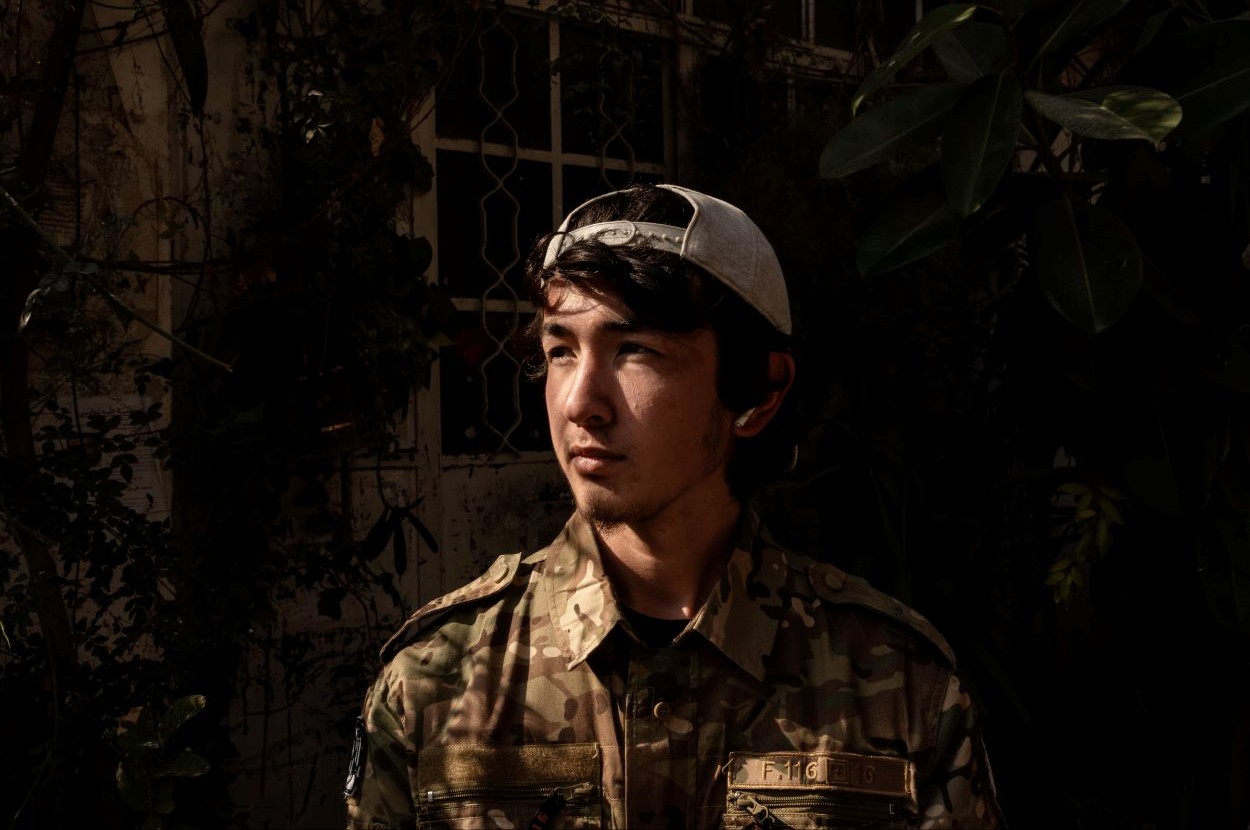
Other powers watch with interest. China has bluntly warned Syria to oppose all terrorism, amid reports of Uyghur militants in the new army. Russia, which has long backed Assad, has been carefully courted by al-Sharaa, who says he values “old and deep ties” with Moscow and does not want a rift. Israel has also been placated for now, with al-Sharaa repeatedly assuring that Syria will not pose a cross-border threat. Israeli officials have noted that their government’s target list is focused on extremist jihadis, not on Arab neighbors.
Gulf Arab states hostile to the Assad regime have rapidly re-engaged. Qatar and Jordan flew diplomats to Daramsuq in December and have since signaled willingness to invest in Syria’s reconstruction. They have not publicly endorsed the foreign fighter issue, but they share the West’s interest in stabilization. Turkey, which helped topple Assad alongside al-Sharaa, has quietly supported targeting ISIS and Al-Qaeda cells in Syria and is said to have lobbied Washington to accept the integration plan.
Increased Sectarian Violence
The issue of foreign fighters in the country has become increasingly prescient in the wake of increased violence targeting Syria’s minority populations. On 21 June 2025, a devastating terrorist attack on the Greek (Rûm) Orthodox Church of Mar Elias in Daramsuq martyred 29 worshippers and injured dozens of others. Although the Syrian Government announced that the attackers were members of an ISIS sleeper cell who came from Al-Hol Camp and were caught within an hour of the attack, security footage and witness accounts reviewed by SyriacPress confirm the attack was carried out by individuals linked to a foreign-led HTS splinter group.
A Reuters investigation published on 30 June uncovered that many of the atrocities committed during a March massacre of roughly 1,500 people, the vast majority of them Alawite civilians, were carried out by non-Arabic-speaking fighters. These killings, which took place over three days along the coastal regions of Latakia and Tartus, followed the collapse of a local pro-Assad revolt. Survivors and witnesses consistently described assailants who did not speak Arabic fluently, if at all, suggesting the involvement of foreign Islamist militants. Victims were executed, mutilated, and had their homes torched, with attackers leaving behind sectarian slogans in Arabic and Urdu.
Reuters traced several of the units involved — some composed of former Hayat Tahrir al-Sham fighters now operating under Syria’s Defense Ministry — back to a command structure that leads to the new government in Damascus. Despite public condemnations from al‑Sharaa and the launch of a fact-finding commission, officials have not directly addressed the foreign composition of the militias or their chain of command. The findings point to a growing influence of transnational jihadist elements within Syria’s state military apparatus, raising new concerns about sectarian retaliation and the stability of the post-Assad government.
The Mar Elias attack and the coastal violence are not isolated incidents of individual elements going roque, but a deeper warning about the makeup of the new security forces. For many in Syria’s diverse ethnic and religious communities, it confirms long-standing fears that granting legal status to jihadists could sanction impunity. These are not men who fought for a democratic Syria — they waged a brutal holy war.
Stakes for Syria and the Region
Domestically, the new citizenship policy could have seismic effects. On the one hand, integrating former jihadist fighters — giving them legal status, jobs, and a stake in Syria’s future — may defuse one source of violence. It could also slightly alter Syria’s sectarian balance, as thousands of Sunni foreign families become full citizens of a country long ruled by Alawite elites. This shift may embolden Sunni-majority HTS hard-liners, but it also removes ambiguity. With passports in hand, these men have less incentive to drift into underground militancy or cross-border plots. Al-Sharaa’s government evidently prefers this path of inclusion. As one adviser argued, it is easier to “control them” in an army hierarchy than let them disappear into insurgency.
On the other hand, the move could exacerbate fractures. Many Syrians, especially minorities and secular Sunnis, deeply mistrust former jihadists. Human Rights Watch and others warn that conferring citizenship on fighters accused of war crimes would clash with promises of “rule of law.” The exodus of hundreds of thousands of ex-regime loyalists — soldiers, bureaucrats, and Alawite families — during the transition leaves a major security gap. Already in March, acting Foreign Minister Asaad al-Shibani was told bluntly by Western diplomats that foreign fighters must be curbed or international support would “evaporate.” Failure to address any abuses by these fighters — from settling old scores to anything as extreme as terrorism — could reignite civil strife.
Regionally, the stakes are high. For Iran and its allies, Syria’s new orientation is a strategic blow. Their proxy militias are being sidelined or disarmed, even as US intelligence has reportedly helped foil ISIS plots in Syria under the new regime. Conversely, Gulf states and Turkey see opportunity in a stabilized, Sunni-led Syria. If citizenship is broadly granted, Syria could re-emerge as a more unified Arab state, albeit an Islamist-dominated one, less beholden to Tehran. This could open the door to re-admission into the Arab League and new investment. But it risks fresh friction with Shia-dominated Iraq, China over Uyghur fighters, and Europe over the repatriation of its citizens. Western security agencies are likely to ramp up surveillance of any returning fighters.
In the end, al-Sharaa is walking a tightrope. At home he must keep fighters loyal — even rewarding them — without alienating the diverse population or new Western and Arab partners. Abroad, he must use their loyalty as leverage, demanding sanctions relief and investment, while promising they pose no external threat. The new government may feel the best solution for controlling the foreign, more extreme elements of its support, is to offer citizenship and structure. Whether that experiment will hold depends on whether these newly minted Syrians can be fully integrated into one of the Middle East’s most diverse countries — and whether al-Sharaa’s fragile coalition can withstand the turbulence he has unleashed.


